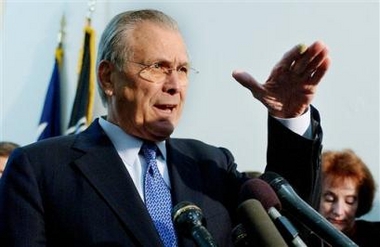|
US: Troop levels in Iraq may drop
(AP)
Updated: 2005-12-09 09:33
US Defense Secretary Donald H. Rumsfeld said Thursday he expects some 20,000
U.S. troops to return home from Iraq after next week's elections, and he
suggested that some of the remaining 137,000 forces could pull out next year.
"If conditions permit, we could go below that," he said in the latest
administration hint of at least a modest reduction next year.
The Pentagon chief also said he believed the White House and Sen. John McCain
would "end up working something out" during negotiations over legislation
standardizing interrogation techniques and banning mistreatment of foreign
terrorism suspects in U.S. custody.
Congressional bargainers were nearing completion of a defense bill that is
expected to include the McCain provisions, and aides said votes on the measure
could come next week. Still, GOP leaders haven't blessed the bill because they
are waiting the result of the White House's negotiations with McCain.
Rumsfeld made his comments between closed-door meetings on Capitol Hill with
House members, part of an effort by the Bush administration to communicate
better with Congress about the war. Gen. Peter Pace, chairman of the Joint
Chiefs of Staff, also attended.
Facing diminishing public support on Iraq and pressure from constituents,
lawmakers from both parties have complained that the administration must give
them more information on Iraq.
Later, Republican lawmakers went to the White House to hear from President
Bush, Rumsfeld, Pace, the U.S. ambassador to Baghdad and top military commanders
in Iraq.

US Defense
Secretary Donald Rumsfeld talks to reporters following a meeting with
members of Congress on Capitol Hill Thursday, Dec. 8, 2005, on the war in
Iraq. [AP] | White House press secretary Scott McClellan said more briefings were planned
for next week, and would include Democrats as well as Republicans from the House
and Senate.
McClellan also rebuffed critics of Bush's war policy, saying there was
"disarray and disagreement" in the Democratic Party over how and when to get out
of Iraq.
In New York, Sen. John Kerry, D-Mass., said, "The current administration
confuses examination of failed policies with an admission of weakness, and
debate with division," resulting in the lack of a real debate to "forge a
winning strategy for America."
Kerry also said the United States must reduce its forces in Iraq by "at least
100,000" by the end of 2006, leaving a force of 30,000 to 40,000.
For his part, Rumsfeld said if next week's elections in Iraq go well he
expects U.S. troop levels, which were boosted to nearly 160,000 this fall for
elections, to return to the 137,000 level of summer.
"The hope is that the conditions will permit some drawdowns in troops," he
said.
The Pentagon chief said the number of forces could fall below 137,000 next
year depending on conditions, the recommendation of senior U.S. commanders and
the president's final determination.
On the issue of detainee treatment, Rumsfeld said negotiations between the
White House and McCain were continuing. The White House hopes to reach a
compromise that would satisfy administration concerns.
"I haven't seen the latest draft, but my guess is they'll end up working
something out," Rumsfeld said.
The Senate overwhelmingly supports the provisions and included them in its
two defense measures. The House measures omit the provisions, and congressional
negotiators are trying to work out final bills.
A top House Republican negotiator on one bill, Armed Services Committee
Chairman Duncan Hunter of California, appeared willing to accept the McCain
provisions unchanged.
But negotiators were still trying to iron out differences over a
Senate-passed provision on prosecuting detainees at the U.S. naval base at
Guantanamo Bay, Cuba. Hunter wants to furthur limit the way they can challenge
their detention.
The White House tried to kill the McCain provisions, but later switched gears
and sought an exemption for covert intelligence agents. However, McCain rejected
that.
In recent days, Bush's national security adviser, Stephen Hadley, has been
seeking some protection from prosecution for agents, in some cases, who are
accused of violating the McCain provisions.
Arguing that the proposal would undermine the intent of his legislation,
McCain has offered to include language similar to that in the Uniform Code of
Military Justice. It would allow accused people to defend themselves if a
reasonable person could have found they were following a lawful order about
treating detainees.
But the White House isn't satisfied with that, and McCain, congressional
aides say, has enough support in the House to stand his ground and insist on his
provisions.
Also Thursday, Rumsfeld dismissed news reports that he plans to step down.
"Those reports have been flying around since about four months after I assumed
my post" in 2001, Rumsfeld said, adding, "I have no plans to retire."
Nevertheless, names for a replacement were being thrown around Washington.
They included Sen. Joe Lieberman, D-Conn., who has supported the administration
on Iraq åK½ï¿½ and who had breakfast with Rumsfeld and Pace on
Thursday.
|